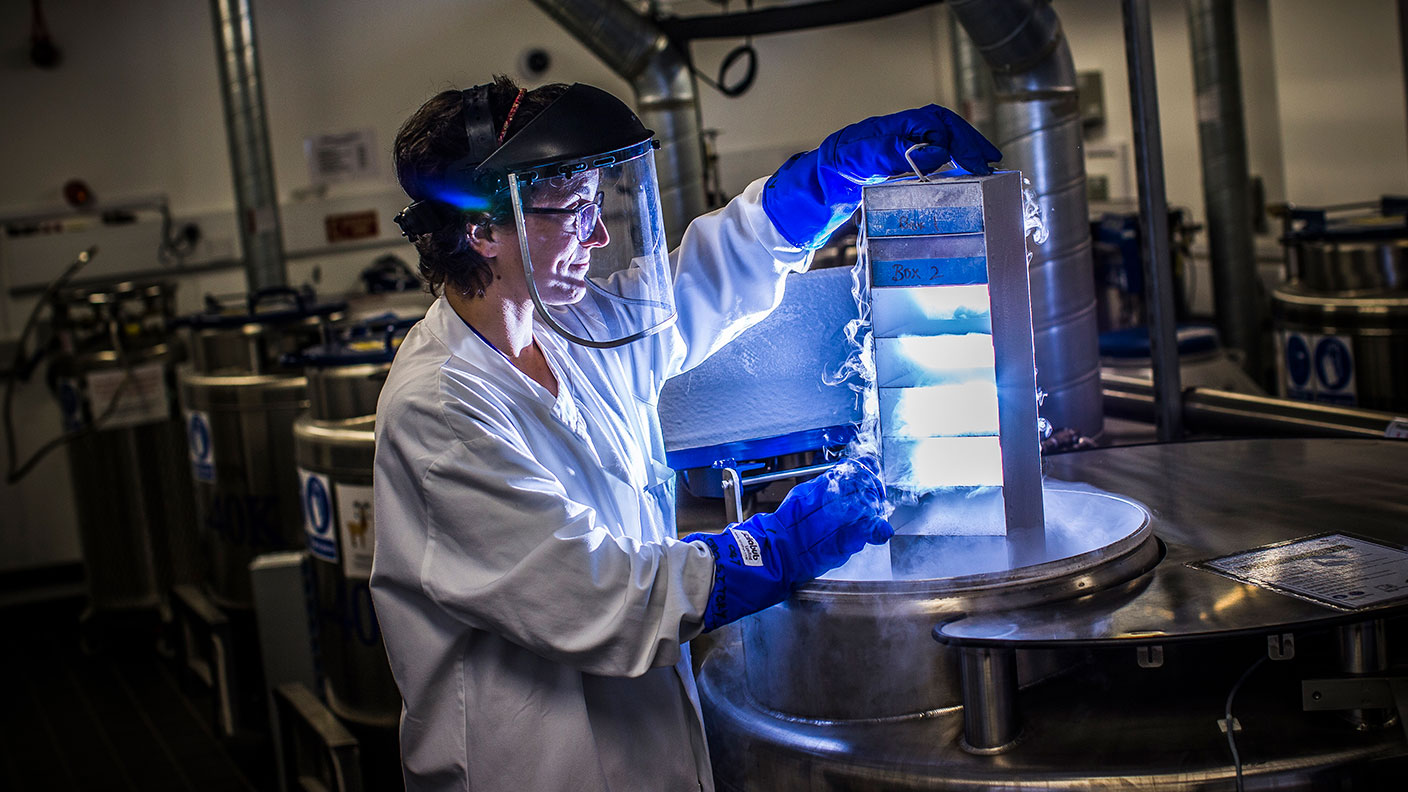This property fund should thrive even amid high inflation and wobbly growth
The UK property market looks increasingly shaky. But one sector stands out as a safe haven – life sciences property.
Pedro Gonçalves

Get the latest financial news, insights and expert analysis from our award-winning MoneyWeek team, to help you understand what really matters when it comes to your finances.
You are now subscribed
Your newsletter sign-up was successful
Want to add more newsletters?

Twice daily
MoneyWeek
Get the latest financial news, insights and expert analysis from our award-winning MoneyWeek team, to help you understand what really matters when it comes to your finances.

Four times a week
Look After My Bills
Sign up to our free money-saving newsletter, filled with the latest news and expert advice to help you find the best tips and deals for managing your bills. Start saving today!
The foundations of the UK property market have trembled. In the residential market, the cost of living crisis and rising interest rates are eroding affordability.
In the commercial market, flexible working has sent shockwaves through the office market and the shift from high-street shopping to warehouses and out of town parks has bifurcated the retail market.
Amid these challenges there’s one sector that stands out as a safe haven. That’s the life sciences property sector.
MoneyWeek
Subscribe to MoneyWeek today and get your first six magazine issues absolutely FREE

Sign up to Money Morning
Don't miss the latest investment and personal finances news, market analysis, plus money-saving tips with our free twice-daily newsletter
Don't miss the latest investment and personal finances news, market analysis, plus money-saving tips with our free twice-daily newsletter
THIS COULD BE THE MOST RESILIENT PART OF THE PROPERTY MARKET
Over the past two years the UK life sciences market has proved itself to be incredibly resilient – It’s one of the fastest growing sections of the economy amid growing interest levels from developers, investors, and landlords regarding the science sector.
Venture capital has poured into the sector in record volumes over the past year. In total, the “Golden Triangle” R&D (research and development) hubs of Oxford, Cambridge and London St Pancras saw £2.4bn of VC raised in 2022.
Life Science Reit (LSE: LABS) was set up to capitalise on this theme, raising £350m from investors in an oversubscribed initial public offering (IPO) in November 2021. It is the only real estate investment trust (Reit), specifically targeting properties suitable for life sciences companies in the “Golden Triangle”.
The Reit has bought 11 Herbrand Street, an Art Deco building close to University College Hospital and University College London. The £85m deal comes with a net initial yield of 4.42%. The property is currently leased to Thought Machine, one of the UK’s leading fintech companies, until 2026.
The Reit plans to transform the building into a “major life science asset.” It’s very close to major universities, while its “ceiling heights, structural slab and large, column-free floor plates,” make it perfect for turning into a life sciences laboratory. As you might imagine, assets with these specific qualities don’t come around too often.
It also acquired Oxford Technology Park for £120.3m, in a deal comprising two complete multi-let office/lab buildings, an on-site hotel and a forward-funded development site.
Contracted rent roll on the portfolio increased from £9.3m at 31 December 2021 to £13.8m at 31 December 2022, primarily as a result of the acquisitions. The portfolio’s estimated rental value (ERV) is £17.2m. Like-for-like ERV growth reached 4.7%.
The company paid or declared dividends totalling 4.0 pence per share in the period from admission in November 2021 to 31 December 2022, meeting its IPO target.
A LACK OF SUITABLE PROPERTIES IS GOOD NEWS FOR LIFE SCIENCE REIT
When a pharma company moves in, it’s likely to stay. What’s more, the money flooding into the sector suggests demand for these unique assets will remain high.
Overall, the company has spent 75% of its IPO proceeds on six major acquisitions with an average unexpired lease term of nearly seven years.
The firm was originally targeting a net asset value (NAV) total return of more than 10% a year and an initial dividend yield of 4% (based on the issue price of 100p).
However, Life Science REIT reported a 8.9% fall in net asset value (NAV) in its maiden annual results. The fund is currently trading at a 32.50% discount, with shares at 61.4p.
The real-estate investment trust is still hoping to achieve dividend growth of 5% a year in the “early years”. That’s below today’s inflation rate, but it could offer investors some protection against uncertainty.
Life Sciences is one of my favourite picks for the current market. Property in general tends to be a solid hedge against inflation, but with the outlook for the economy bleak amid higher interest rates, it’s challenging to pick potential winners.
However, the biotech and healthcare sectors tend to be fairly resilient to economic ups and downs. This factor, combined with the flood of money entering the UK life sciences industry, as well as the unique nature of these assets, implies the backdrop for this sector of the property market is better than most.
The stock might not be the most exciting investment around – it’s unlikely to be a double-bagger any time soon –but as a way to protect and grow your wealth in uncertain times, this seems to me to be one of the better options.
SEE ALSO:
Invest in commercial property – British landlords are back in business
Are UK house prices heading for a fall?
Join us at the MoneyWeek Summit on 29.09.2023 at etc.venues St Paul's, London.
Tickets are on sale at www.moneyweeksummit.com
MoneyWeek subscribers receive a 25% discount.
Get the latest financial news, insights and expert analysis from our award-winning MoneyWeek team, to help you understand what really matters when it comes to your finances.

Rupert is the former deputy digital editor of MoneyWeek. He's an active investor and has always been fascinated by the world of business and investing. His style has been heavily influenced by US investors Warren Buffett and Philip Carret. He is always looking for high-quality growth opportunities trading at a reasonable price, preferring cash generative businesses with strong balance sheets over blue-sky growth stocks.
Rupert has written for many UK and international publications including the Motley Fool, Gurufocus and ValueWalk, aimed at a range of readers; from the first timers to experienced high-net-worth individuals. Rupert has also founded and managed several businesses, including the New York-based hedge fund newsletter, Hidden Value Stocks. He has written over 20 ebooks and appeared as an expert commentator on the BBC World Service.
- Pedro GonçalvesContributor
-
 Average UK house price reaches £300,000 for first time, Halifax says
Average UK house price reaches £300,000 for first time, Halifax saysWhile the average house price has topped £300k, regional disparities still remain, Halifax finds.
-
 Barings Emerging Europe trust bounces back from Russia woes
Barings Emerging Europe trust bounces back from Russia woesBarings Emerging Europe trust has added the Middle East and Africa to its mandate, delivering a strong recovery, says Max King
-
 Halifax: House price slump continues as prices slide for the sixth consecutive month
Halifax: House price slump continues as prices slide for the sixth consecutive monthUK house prices fell again in September as buyers returned, but the slowdown was not as fast as anticipated, latest Halifax data shows. Where are house prices falling the most?
-
 Rents hit a record high - but is the opportunity for buy-to-let investors still strong?
Rents hit a record high - but is the opportunity for buy-to-let investors still strong?UK rent prices have hit a record high with the average hitting over £1,200 a month says Rightmove. Are there still opportunities in buy-to-let?
-
 Pension savers turn to gold investments
Pension savers turn to gold investmentsInvestors are racing to buy gold to protect their pensions from a stock market correction and high inflation, experts say
-
 Where to find the best returns from student accommodation
Where to find the best returns from student accommodationStudent accommodation can be a lucrative investment if you know where to look.
-
 The world’s best bargain stocks
The world’s best bargain stocksSearching for bargain stocks with Alec Cutler of the Orbis Global Balanced Fund, who tells Andrew Van Sickle which sectors are being overlooked.
-
 Revealed: the cheapest cities to own a home in Britain
Revealed: the cheapest cities to own a home in BritainNew research reveals the cheapest cities to own a home, taking account of mortgage payments, utility bills and council tax
-
 UK recession: How to protect your portfolio
UK recession: How to protect your portfolioAs the UK recession is confirmed, we look at ways to protect your wealth.
-
 Buy-to-let returns fall 59% amid higher mortgage rates
Buy-to-let returns fall 59% amid higher mortgage ratesBuy-to-let returns are slumping as the cost of borrowing spirals.

